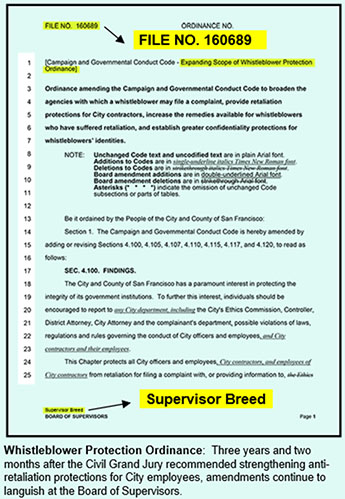 Printer-friendly PDF file
Printer-friendly PDF fileWestside Observer Newspaper
September 2018 at www.WestsideObserver.com
City Employees Living in Each City District at Risk
Slow-Moving, Stalled, Legislation
 Printer-friendly PDF file
Printer-friendly PDF file
Westside Observer
Newspaper
September 2018 at www.WestsideObserver.com
City Employees Living in Each City District at Risk
Slow-Moving, Stalled, Legislation
by Patrick Monette-Shaw
Wikipedia notes the phrase “justice delayed is justice denied” is a legal maxim, meaning that if legal redress is available for a party that has suffered some injury but is not forthcoming in a timely fashion, it is effectively the same as having no redress at all.
It’s unfair for any injured party to have to sustain an injury with little hope for resolution, because courts or governments acting too slowly in resolving legal issues deprive them of legal rights to protection under the law.
That brings us to local legislation stalled at the Board of Supervisors and the effects the delayed legislation has on depriving San Francisco city employees of legal protections.
Consider three pieces of legislation that have faced delays.
Additional Campaign Finance Disclosure
During the last election to the San Francisco Employees’ Retirement System board of directors held between January and  February 2017, one candidate — Al Casciato, a retired SFPDpolice captain — bragged during one endorsement meeting that the POA was donating $100,000 to his election campaign, and the International Federation of Professional and Technical Engineers (IFPTE) Local 21 was expected to donate an additional $85,000 to his campaign, for a total of $185,000.
February 2017, one candidate — Al Casciato, a retired SFPDpolice captain — bragged during one endorsement meeting that the POA was donating $100,000 to his election campaign, and the International Federation of Professional and Technical Engineers (IFPTE) Local 21 was expected to donate an additional $85,000 to his campaign, for a total of $185,000.
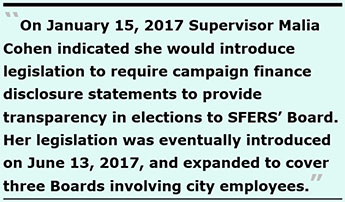 A San Francisco Examiner article reported on January 15, 2017 that Supervisor Malia Cohen — who may have heard about Casciato’s bragging of how much he hoped to raise for his election campaign to buy a seat on SFERS’ Board — would submit a “drafting request for legislation” to require campaign finance disclosure statements to provide transparency in elections to SFERS’ Board. Cohen submitted her drafting request to the City Attorney on January 18, even before the February 3, 2017 closing date of SFERS’s election. Casciato won, buying himself a seat.
A San Francisco Examiner article reported on January 15, 2017 that Supervisor Malia Cohen — who may have heard about Casciato’s bragging of how much he hoped to raise for his election campaign to buy a seat on SFERS’ Board — would submit a “drafting request for legislation” to require campaign finance disclosure statements to provide transparency in elections to SFERS’ Board. Cohen submitted her drafting request to the City Attorney on January 18, even before the February 3, 2017 closing date of SFERS’s election. Casciato won, buying himself a seat.
Unfortunately, it took another six months before Cohen’s legislation was eventually written and introduced on June 13, 2017 and assigned to the Rules Committee under the Board’s 30-Day Rule. It was expanded to cover elections to three Boards:
“Ordinance amending the Administrative Code to require disclosure of candidate and third-party spending in Retirement Board, Health Service Board and Retiree Health Care Trust Fund Board elections; set late filing fees and penalties for violations; and specify that the Ethics Commission will enforce the related disclosure requirements.”
The legislation was then referred on June 21, 2017 for informational purposes to the Retirement Board, Health Service System, Health Commission, Department of Elections, and City Controller, but perhaps not to the Retiree Health Care Trust Fund Board. The next day it was also forwarded to the Ethics Commission for informational purposes.
 The legislation then languished, forcing Cohen to request on April 2, 2018 that her legislation remain active for an additional six months, until October 2, 2018. It had been “continued” (tabled) to the Call of the Chair of the Rules Committee on September 13 and despite Cohen’s April 2018 request to keep the legislation active, the legislation was again continued to the Call of the Chair on June 11, 2018. Thankfully, it was re-introduced on July 25 bearing a new title and language, and it was approved at Rules and forwarded to the full Board of Supervisors.
The legislation then languished, forcing Cohen to request on April 2, 2018 that her legislation remain active for an additional six months, until October 2, 2018. It had been “continued” (tabled) to the Call of the Chair of the Rules Committee on September 13 and despite Cohen’s April 2018 request to keep the legislation active, the legislation was again continued to the Call of the Chair on June 11, 2018. Thankfully, it was re-introduced on July 25 bearing a new title and language, and it was approved at Rules and forwarded to the full Board of Supervisors.
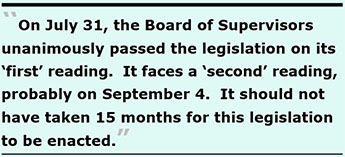 On July 31, 2018 the full Board of Supervisors unanimously passed the legislation — File No. 170738 — on its “first” reading. Hopefully, it will be finally passed on second reading at the Board of Supervisors September 4 meeting when they return from recess.
On July 31, 2018 the full Board of Supervisors unanimously passed the legislation — File No. 170738 — on its “first” reading. Hopefully, it will be finally passed on second reading at the Board of Supervisors September 4 meeting when they return from recess.
It should not have taken fully 15 months between when Cohen introduced this legislation on June 13, 2017 and the Board passes it (hopefully) on September 4, 2018 — plus a six-month delay between January and June 2017 to have a Deputy City Attorney craft the legislation — for this legislation to be enacted.
This delayed justice redress should not have taken 21 months.
Expanding Sexual Harassment Prevention Training
On May 22, 2018 Supervisors London Breed, Malia Cohen, Katy Tang, and Catherine Stefani introduced File No. 180546 — Harassment Prevention Training for City Employees — which was assigned under the Board’s 30-Day Rule to the Rules Committee with a response due back on June 21, 2017.
The legislative history shows that on May 30, the legislation was referred to the Department of Human Resources and the Department on the Status of Women for informational purposes and feedback to the Rules Committee.
The legislative history also shows that on June 28, a response was received from the Commission on the Status of Women, which had voted unanimously on June 27 to support the proposed legislation. Unfortunately, as of August 18, the legislative history does not show whether the City’s centralized Department of Human Resources ever responded.
 Unfortunately, when the Board of Supervisors went out on its August month-long recess on July 31, 2018 no Rules Committee hearing had been held on the legislation. As of August 18, Rules Committee action on the legislation remains listed as “pending.”
Unfortunately, when the Board of Supervisors went out on its August month-long recess on July 31, 2018 no Rules Committee hearing had been held on the legislation. As of August 18, Rules Committee action on the legislation remains listed as “pending.”
The legislation notes in the Findings that:
“In federal Fiscal Year 2017, over 84,000 workplace discrimination charges were filed with the U.S Equal Employment Opportunity Commission (“EEOC”), approximately 30% of those charges were related to sex discrimination, and over 6,500 of those charges were for sexual harassment.”
 Of the 84,000 workplace discrimination charges filed across the U.S., 30% equals approximately 25,200 of the charges were for sexual discrimination.
Of the 84,000 workplace discrimination charges filed across the U.S., 30% equals approximately 25,200 of the charges were for sexual discrimination.
The main features of the legislation in File No. 180546 provides:
 The harassment prevention training will be expanded from requiring only employees who supervise, or could potentially supervise other employees, to include all City employees who work more than 20 hours a week. Based on the City Controller’s payroll database for FY 2017–2018 that ended on June 30, 2018, of 42,271 employees in the database, 10,234 — nearly one-quarter, or 24.4% — worked less than 20 hours per week and will not receive the expanded harassment prevention training.
The harassment prevention training will be expanded from requiring only employees who supervise, or could potentially supervise other employees, to include all City employees who work more than 20 hours a week. Based on the City Controller’s payroll database for FY 2017–2018 that ended on June 30, 2018, of 42,271 employees in the database, 10,234 — nearly one-quarter, or 24.4% — worked less than 20 hours per week and will not receive the expanded harassment prevention training. It’s not known if or when the Rules Committee will get around to holding a hearing on the legislation and forward it to the full Board of Supervisors for adoption. It should not have taken at least three months to consider the legislation.
It’s not known if or when the Rules Committee will get around to holding a hearing on the legislation and forward it to the full Board of Supervisors for adoption. It should not have taken at least three months to consider the legislation.
As the Westside Observer reported in April 2018, between January 1, 2007 and December 22, 2017 the City spent $70 million to settle 330 lawsuits brought by city employees for a variety of prohibited personnel practices already proscribed by local, state and federal laws, including wrongful termination, sexual harassment and sexual discrimination, age or disability discrimination, racial discrimination and racial harassment, and other prohibited practices.
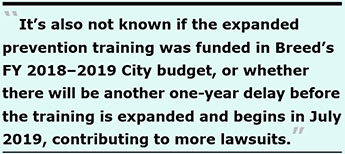 Of the 330 lawsuits, 37 involved three harassment categories: sexual harassment, “general” harassment, and racial harassment. The 37 lawsuits cost $8.5 million between settlements awarded and City Attorney time and expenses, fully 12.1% of the $70 million total.
Of the 330 lawsuits, 37 involved three harassment categories: sexual harassment, “general” harassment, and racial harassment. The 37 lawsuits cost $8.5 million between settlements awarded and City Attorney time and expenses, fully 12.1% of the $70 million total.
It’s also not known if the expanded prevention training was funded in Breed’s FY 2018–2019 City budget, or whether the delayed legislation will cause another one-year delay before the training is expanded and begins in July 2019.
The delayed legislation may contribute to additional sexual harassment complaints and lawsuits before the expanded prevention training may begin in 2019.
Whistleblower Protection Ordinance Amendments
 The most egregious example of delayed legislation involves whistleblower protections for City employees, which legislation has languished for over three years.
The most egregious example of delayed legislation involves whistleblower protections for City employees, which legislation has languished for over three years.
As we have previously reported in the Westside Observer in July 2015, San Francisco’s 2014–2015 Civil Grand Jury released its report “San Francisco’s Whistleblower Protection Ordinance Is in Need of Change,” dated May 2015 and published on June 8, 2015.
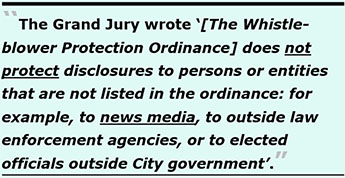 The Grand Jury noted that in the 15-year history of the Ethics Commission, no whistleblower retaliation complaint was upheld and sustained by the Ethics Commission, or ever resulted in a public accusation of wrongdoing, because all complaints are investigated in secret and all were dismissed without public hearings. The Jury noted that in the three-year period between January 2011 and November 2014, the Ethics Commission had received 34 whistleblower retaliation complaints, all of which were simply dismissed by the Ethics Commission’s Executive Director.
The Grand Jury noted that in the 15-year history of the Ethics Commission, no whistleblower retaliation complaint was upheld and sustained by the Ethics Commission, or ever resulted in a public accusation of wrongdoing, because all complaints are investigated in secret and all were dismissed without public hearings. The Jury noted that in the three-year period between January 2011 and November 2014, the Ethics Commission had received 34 whistleblower retaliation complaints, all of which were simply dismissed by the Ethics Commission’s Executive Director.
The Jury wrote:
“[The Whistleblower Protection Ordinance] does not protect disclosures that are made by other means, or to persons or entities that are not listed in the ordinance: for example, to news media, to outside law enforcement agencies, or to elected officials outside City government. Thus, a City employee who discloses government wrongdoing or corruption to the San Francisco Chronicle, or to the California Attorney General, or to the F.B.I., or to Congress, is not a ‘whistleblower’ entitled to [anti-retaliation] protection under the WPO.”
The Jury recommended that if the Ethics Commission requests the Board of Supervisors amend the WPO and the Board or the Mayor fails to act, that the Ethics Commission should consider submitting WPO amendments directly to the voters.
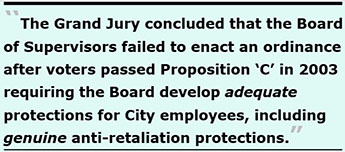 The Grand Jury concluded that the Board of Supervisors failed to carry out a mandate to enact and maintain an ordinance after voters passed Proposition “C” in 2003 requiring the Board to develop adequate protections for City officers and employees against retaliation for filing complaints involving improper government activity by City officers and employees. The Grand Jury wanted genuineanti-retaliationprotections enacted. Now 15 years after Prop “C” was passed, the Whistleblower Protection Ordinance (WPO) has still not been amended adequately.
The Grand Jury concluded that the Board of Supervisors failed to carry out a mandate to enact and maintain an ordinance after voters passed Proposition “C” in 2003 requiring the Board to develop adequate protections for City officers and employees against retaliation for filing complaints involving improper government activity by City officers and employees. The Grand Jury wanted genuineanti-retaliationprotections enacted. Now 15 years after Prop “C” was passed, the Whistleblower Protection Ordinance (WPO) has still not been amended adequately.
The Jury specifically recommended that amendments to the WPO include reporting complaints to any City department, not just the employee’s own department. [The most current version of the WPO proposed amendments continue to restrict complainants to filing complaints with a handful of City agencies, and only to their own, not other, City departments, and doesn’t address filing oral complaints.]
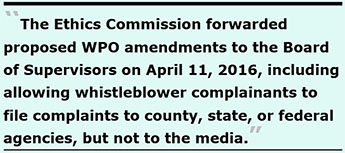 The Mayor, Board of Supervisors, and Ethics Commission ostensibly agreed to allow Ethics to take the lead on crafting proposed WPO amendments.
The Mayor, Board of Supervisors, and Ethics Commission ostensibly agreed to allow Ethics to take the lead on crafting proposed WPO amendments.
A year later, the Westside Observer also reported that in July 2016, the Ethics Commission held two hearings (on January 20 and February 24, 2016) and forwarded proposed WPO amendments to the Board of Supervisors on April 11, 2016; the Ethics Commission amendments were dated March 28, 2016. The Ethics recommendations included allowing complainants to file complaints with any City agency (not just their own with their own department) and to also allow complainants to file complaints to county, state, or federal agencies. Ethics recommended also covering oral complaints, not just written complaints. Ethics stopped short of extending anti-retaliation protections to city employees who contact the media.
Version 1: File No. 160689
 Sadly, it took another two months before then-Board president London Breed finally introduced legislation on June 14, 2016 to amend the WPO, assigning it to the Board of Supervisors Rules Committee. The legislation became File No. 160689.
Sadly, it took another two months before then-Board president London Breed finally introduced legislation on June 14, 2016 to amend the WPO, assigning it to the Board of Supervisors Rules Committee. The legislation became File No. 160689.
The legislative history of the amendments is disturbing:
 Two months, later Breed suddenly transferred the WPO amendments from the Rules Committee to the Government Audits and Oversight Committee on September 7, 2016.
Two months, later Breed suddenly transferred the WPO amendments from the Rules Committee to the Government Audits and Oversight Committee on September 7, 2016.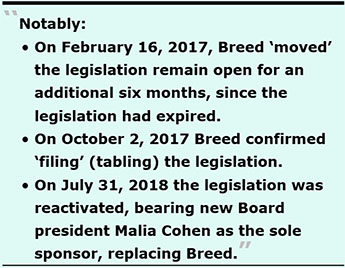 n February 16, 2017, Breed “moved” that the legislation remain open for an additional six months until August 16, 2017, since the legislation had expired.
n February 16, 2017, Breed “moved” that the legislation remain open for an additional six months until August 16, 2017, since the legislation had expired.Oddly, the Ethics Commission had provided this author with an updated version of proposed amendments that had been revised on January 17, 2017 (that may not have been submitted to the Board’s GAO or Rules Committees). But sadly, it isn’t known if the January 2017 revised amendments had ever been provided to the Government Audits and Oversight Committee, since the legislative history of File No. 160689 reports just one version of the amendments, rather than successively-numbered versions incorporating the January 2017 revisions, and the July 31, 2018 revision replacing Breed as the sole sponsor with Cohen as the sole sponsor. There should have been at least three versions of the amendments posted in the legislative history records, not just one.
In April 2017 the Westside Observer published a side-by-side comparison of the March 28, 2016 amendments submitted by the Ethics Commission to the January 2017 revisions. Most disturbingly, the side-by-side comparison noted that the March 2016 amendments from Ethics specifically addressed protecting all City employees and City contractors’ employees from retaliation for filing a whistleblower complaint. But the January 2017 edited amendments redirected the focus saying the WPO sets forth requirements for the City’s whistleblower program, and only secondarily protects employees against retaliation.
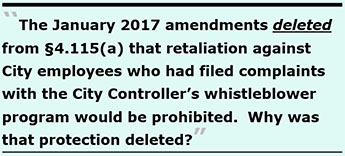 But the January 2017 proposed amendments deleted from §4.115(a) that retaliation against both City employees and City contractors who had filed complaints with the City Controller’s whistleblower program would be prohibited. Why would the section in the WPO amendments prohibiting retaliation against employees who filed complaints with the Controller’s whistleblower program not be explicitly named as deserving protection for whistleblowing? Why was that protection deleted?
But the January 2017 proposed amendments deleted from §4.115(a) that retaliation against both City employees and City contractors who had filed complaints with the City Controller’s whistleblower program would be prohibited. Why would the section in the WPO amendments prohibiting retaliation against employees who filed complaints with the Controller’s whistleblower program not be explicitly named as deserving protection for whistleblowing? Why was that protection deleted?
Version 2: File No. 180317
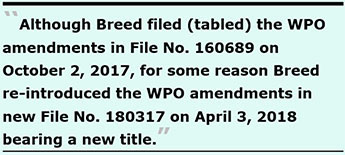 Although Breed filed (tabled) the WPO amendments in File No. 160689 on October 2, 2017, for some reason Breed re-introduced the WPO amendments in new File No. 180317 on April 3, 2018 bearing a new title, which was assigned to the Rules Committee. The legislation’s title was changed from reading in File No. 160689 “Expanding Scope of the Whistleblower Protection Ordinance,” by chopping it down in File No. 180317 to reading “Expanding Whistleblower Protections.” Deleting from the title both the words “scope” and “ordinance” is troubling, as it may not be just semantics.
Although Breed filed (tabled) the WPO amendments in File No. 160689 on October 2, 2017, for some reason Breed re-introduced the WPO amendments in new File No. 180317 on April 3, 2018 bearing a new title, which was assigned to the Rules Committee. The legislation’s title was changed from reading in File No. 160689 “Expanding Scope of the Whistleblower Protection Ordinance,” by chopping it down in File No. 180317 to reading “Expanding Whistleblower Protections.” Deleting from the title both the words “scope” and “ordinance” is troubling, as it may not be just semantics.
One of the legislative aides to now-Board president Malia Cohen noted on August 14:
“This file 180317 was introduced earlier this year to address the problems of 160689, which is why Supervisor Breed closed the file on the original.” [Emphasis added]
The “problems” with File No. 160689 were not described.
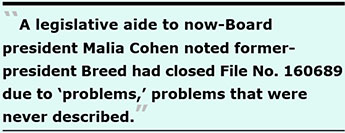 During the two-and-a-half years the WPO amendments in File No. 160689 were being vetted for additional amendments, the District Attorney’s office waited until August 16, 2018 to recommend an additional suggestion. Previous versions of the amendments included language that the Ethics Commission could disclose names of confidential whistleblower complainants only when necessary to conduct an Ethics investigation. The initial language had read:
During the two-and-a-half years the WPO amendments in File No. 160689 were being vetted for additional amendments, the District Attorney’s office waited until August 16, 2018 to recommend an additional suggestion. Previous versions of the amendments included language that the Ethics Commission could disclose names of confidential whistleblower complainants only when necessary to conduct an Ethics investigation. The initial language had read:
§4.120(d)(1) Exceptions — Conduct of Investigations
“Nothing in this Section shall preclude the Ethics Commission from disclosing the identity of an individual or other information to the extent necessary to conduct its investigation.”
At the 11th hour, the District Attorney requested an amendment to expand the exceptions to allow law enforcement agencies to disclose the identity and names, when necessary. The D.A. proposed the language be changed to read:
§4.120(d)(1) Exceptions — Conduct of Investigations
“Nothing in this Section shall preclude the Ethics Commission or a law enforcement agency investigating a complaint or prosecuting a matter arising out of a complaint made pursuant to this chapter from disclosing the identity of an individual or other information to the extent necessary to conduct its investigation or prosecution.”
Why it took the D.A well over two years before suggesting this proposed change is nothing short of remarkable.
Given the two-and-a-half-year delay on these amendments at the Board of Supervisors, Ethics should just regain control of the WPO amendments and place them on the ballot themselves for voters to adopt, as Ethics indicated in 2015 it might do if the Board of Supervisors failed to act on the Grand Jury’s and its recommendations and pass WPO amendments.
Whistleblower Anti-Retaliation Training
 While researching this article, I learned Ethics Commission staffer Jeffrey Pierce had created a presentation on May 17, 2018 that was presented during a City Controller Office’s Whistleblower Department Liaison Training session at City Hall on June 14, which I obtained under a records request. It’s not yet known how many departmental liaisons received this training, and may have been misled.
While researching this article, I learned Ethics Commission staffer Jeffrey Pierce had created a presentation on May 17, 2018 that was presented during a City Controller Office’s Whistleblower Department Liaison Training session at City Hall on June 14, which I obtained under a records request. It’s not yet known how many departmental liaisons received this training, and may have been misled.
I became concerned because the training presented indicated the Whistleblower Protection Ordinance does not include as a “protected activity” any First Amendment activities, like whistleblowing to the broadcast media, to the print media, or to the FBI. That the WPO amendments still don’t address First Amendment speech as being a “protected” activity worthy of anti-retaliation protections is troubling.
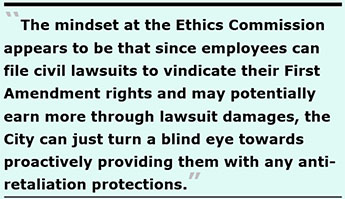 Paragraph 1(b)(iii) in the anti-retaliation prevention training noted:
Paragraph 1(b)(iii) in the anti-retaliation prevention training noted:
“Note also: protected activity doesn’t cover First Amendment activity like reporting to the press.
An employee can bring a civil action in federal court to vindicate their first amendment rights – and stands to win substantially more in damages.”
The mindset at the Ethics Commission — and likely at the City Attorney’s Office — appears to be that since employees can file civil lawsuits to vindicate their First Amendment rights and may potentially earn more through lawsuit damages, the City can just turn a blind eye towards proactively providing them with any anti-retaliation protections under the WPO. While they may earn more in damages from court-awarded settlements, they earn nothing in the way of anti-retaliation protections.
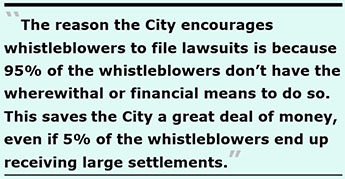 One astute observer (who spoke on condition of anonymity) indicated the reason the City so generously encourages whistleblowers to file lawsuits is because 95% of the whistleblowers don’t have the wherewithal or financial means to do so. This saves the City a great deal of money, even if 5% of the whistleblowers end up receiving large settlements.
One astute observer (who spoke on condition of anonymity) indicated the reason the City so generously encourages whistleblowers to file lawsuits is because 95% of the whistleblowers don’t have the wherewithal or financial means to do so. This saves the City a great deal of money, even if 5% of the whistleblowers end up receiving large settlements.
That suggests the 95% of whistleblowers who don’t have the means to file lawsuits essentially have no redress at all, and no anti-retaliation protections. The $70 million the City has paid out in settlements and City Attorney time and expenses are viewed by the City as a cost of doing business.
I have to wonder how many of the 84,000 workplace discrimination charges filed in Fiscal Year 2017with the U.S Equal Employment Opportunity Commission had initially been triggered by First Amendment speech activities.
 How many City “liaisons” received this training to ignore First Amendment speech and were told that such activity isn’t protected from retaliation? What kind of message is that?
How many City “liaisons” received this training to ignore First Amendment speech and were told that such activity isn’t protected from retaliation? What kind of message is that?
This delayed justice redress should not have taken over three years to consider adopting amendments to the WPO.
What’s Next?
 Much of the justice-delayed stalled legislation is due, in large measure, to London Breed’s foot-dragging when she was then Board President.
Much of the justice-delayed stalled legislation is due, in large measure, to London Breed’s foot-dragging when she was then Board President.
That’s not too surprising, since San Francisco’s Sunshine Ordinance Task Force had referred then-Supervisor Breed’s multiple Sunshine Ordinance violations to District Attorney George Gascón for enforcement, a development that will hopefully be explored in the Westside Observer’s October issue.
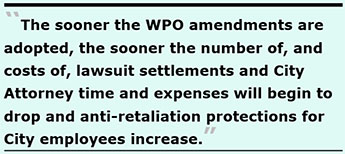 By report, new Board president Malia Cohen is thoughtfully considering sponsoring the Whistleblower Protection Ordinance amendments and is leaning towards doing so. After two-and-a-half years of the legislation languishing at the Board of Supervisors, Cohen should move the legislation forward rapidly. After all, we’re already up to at least $70 million in costs to settle a variety of prohibited personnel practices since 2007.
By report, new Board president Malia Cohen is thoughtfully considering sponsoring the Whistleblower Protection Ordinance amendments and is leaning towards doing so. After two-and-a-half years of the legislation languishing at the Board of Supervisors, Cohen should move the legislation forward rapidly. After all, we’re already up to at least $70 million in costs to settle a variety of prohibited personnel practices since 2007.
The sooner the WPO amendments are adopted, the sooner the number of, and costs of, lawsuit settlements and City Attorney time and expenses will begin to drop, along with a drop in wrongful retaliation against City employees and an increase in anti-retaliation protections for them.
After all, when the Grand Jury released its report in June 2015, a dozen years had passed following passage of Prop. “C” by voters in 2003. Add in the three years since, and we’re up to a decade-and-a-half of inaction by the Board of Supervisors to strengthen whistleblower protections for City employees.
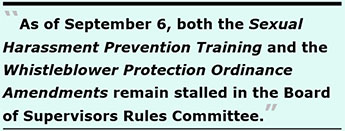 As I was posting this article on-line, the Board of Supervisors released the agenda for its September 6 Rules Committee meeting. Notably absent from the agenda are both the expanded Sexual Harassment Prevention Training (File No. 180546) and the Whistleblower Protection Ordinance Amendments (File No. 180317). Both pieces of legislation are still stalled at the Rules Committee, and it’s not yet known whether either of the two Ordinances will ever be heard at Rules.
As I was posting this article on-line, the Board of Supervisors released the agenda for its September 6 Rules Committee meeting. Notably absent from the agenda are both the expanded Sexual Harassment Prevention Training (File No. 180546) and the Whistleblower Protection Ordinance Amendments (File No. 180317). Both pieces of legislation are still stalled at the Rules Committee, and it’s not yet known whether either of the two Ordinances will ever be heard at Rules.
Monette-Shaw is a columnist for San Francisco’s Westside Observer newspaper, and a member of the California First Amendment Coalition (FAC) and the ACLU. He operates stopLHHdownsize.com. Contact him at monette-shaw@westsideobserver.com.
Postscript: Ethics Has Zero Records
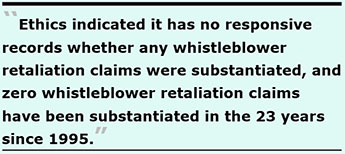 August 18, 2018 Westside Observer investigative reporter Dr. Derek Kerr (himself a former City employee whistleblower) placed a records request to San Francisco’s Ethics Commission seeking records showing whether Ethics had ever proved or substantiated any whistleblower retaliation claims. He also asked that Ethics disclose the number of whistleblower retaliation claims the Ethics Commission had substantiated since 1995.
August 18, 2018 Westside Observer investigative reporter Dr. Derek Kerr (himself a former City employee whistleblower) placed a records request to San Francisco’s Ethics Commission seeking records showing whether Ethics had ever proved or substantiated any whistleblower retaliation claims. He also asked that Ethics disclose the number of whistleblower retaliation claims the Ethics Commission had substantiated since 1995.
Sadly, on August 29 Ethics responded to Kerr, and also reported that zero whistleblower retaliation claims have been substantiated in the 23 years since 1995.